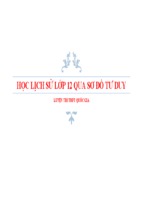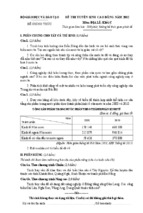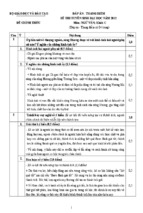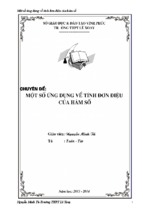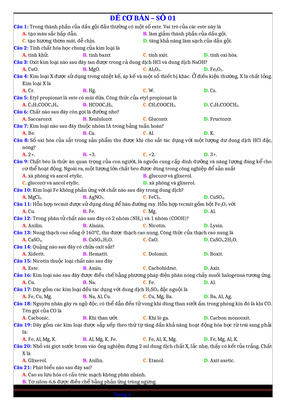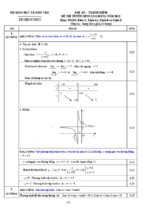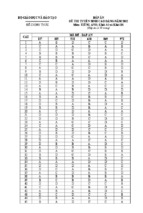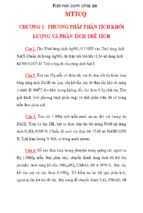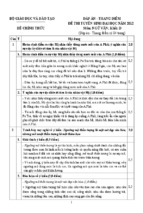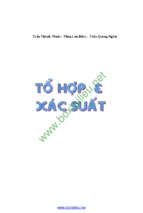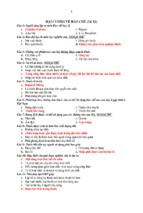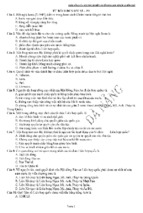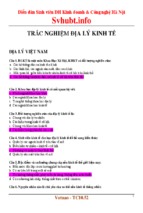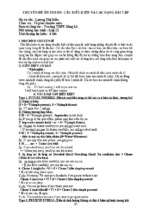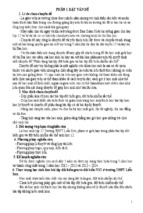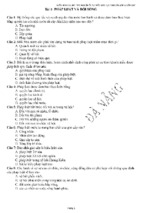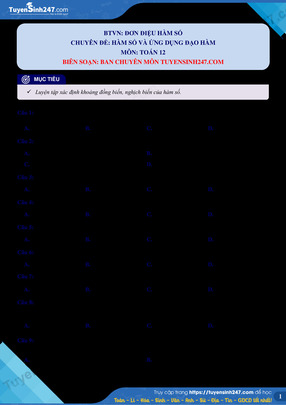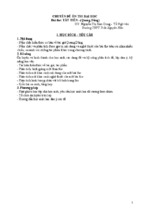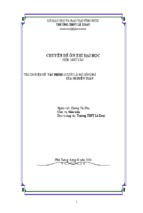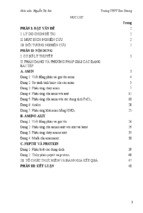SỞ GIÁO DỤC ĐÀO TẠO VĨNH PHÚC
TRƯỜNG THPT LÊ XOAY
- - -*** - - -
BÁO CÁO CHUYÊN ĐỀ ÔN THI ĐẠI HỌC
MÔN: TIẾNG ANH
CHUYÊN ĐỀ: CONDITIONALS – WISHES
G/v Thực hiện: Phạm Thị Thanh Huyền
Năm học: 2013-2014
GIỚI THIỆU
Ngữ pháp là một phần rất quan trọng trong việc học ngoại ngữ. Nắm chắc được ngữ
pháp giúp người học nghe, nói, đọc và viết được ngôn ngữ mà mình đang học. Đối với
các em học sinh theo học khối D, A1 thì việc nắm vững được ngữ pháp Tiếng anh giúp
các em dành được điểm cao hơn trong các kì thi đặc biệt là kì thi vào Đại học.
“Conditionals – wishes” là một trong những mảng kiến thức quan trọng thường
thấy xuất hiện trong đề thi đại học ở cả hai phần như lexico Gammar và phần sentence
tranfornation (chuyển đổi cấu trúc tương đương). Nhìn chung các em học sinh thường có
thể làm được các bài tập có liên quan đến câu điều kiện thông thường như loại I, II và III.
Tuy nhiên khi gặp phải những câu là câu điều kiện lẫn lộn “mixed conditionals” hoặc một
số những cấu trúc câu điều kiện khác mà yêu cầu của đề thi đại học chủ yếu liên quan tới
các phần đó thì học sinh thường hay bị lúng túng, nhầm lẫn.
Chính vì lí do này nên tôi chọn chuyên đề này nhằm mục đích cung cấp được cho
học sinh một cách đầy đủ về chuyên đề “Conditionals – wishes”, giúp các em hiểu và biết
cách vận dụng một cách nhuần nhuyễn phần mảng kiến thức này khi làm bài tập. Và cuối
cùng là tự tin hơn khi làm bài thi có gặp những câu hỏi liên quan đến kiến thức phần này.
Đối tượng học sinh bồi dưỡng là các em học sinh theo học khối D, A1 đặc biệt là
các em đang chuẩn bị thi vào đại học.
CONTENTS
A. Grammatical points
I. Types of conditionals
II. Other conditional structure
III. “wishes” and other structures with “wishes”
IV. Methods of teaching and learning.
B. System of Exercises and detailed explanation (key)
I. Conditional Exercises
II. “wishes” Exercises
GRAMMAR: CONDITIONALS
I. Types of conditionals
1. zero conditional
2. first conditional
3. second conditional
4. third conditional
5. Mixed conditional
6. Inverted conditionals
1. Zero conditional
a, Form
If - clause
If + present simple
If S + V/Vs/es +
Main – clause
The present simple
S + V/Vs/es +
b, Use
- General truths, scientific facts and definitions.
(Sự thật luôn đúng, hiện tượng hay định nghĩa khoa học)
Eg: If air expands, it becomes lighter.
2. First conditional
a, Form
If - clause
If + present tense
(present S, present cont or present
perf)
Can/may/might/must/should/ought
Main – clause
Future / imperative
to, have to + V bare/ ing
Use:
- Real or likely conditions in the present or future and theirs results in the present and
future.
- To give instructions
(Nói về giả định có khả năng xảy ra ở hiện tại hoặc tương lai)
Watch out:
We can also use should + bare infinitive instead of present simple.
This suggest the situation is possible, but unlikely to happen.
Eg: If you should bump into Alex at the concert, you will be able to get a left home.
We can also use a form if the first conditional to give instructions, commands,
invitations that depend on a certain condition in the present/future.
If + a present tense, imperative
Eg: - If you decide to have a birthday party, tell me (commands)
- If you want the seat to reduce, press the button (instructions)
- If you come to Nha Trang, stay with us (imitations)
3. Second conditional (The unreal present)
a, Form
If - clause
If + past simple / past continuous
(tobe: were in all persons)
Main – clause
Would/could/might + bare infinitive
b, use: - Impossible, unlikely or hypothetical conditions in the present or future and their
results in the present or future also used to give advice.
(giả định trái với thực tế ở hiện tại)
Eg: If I saw a ghost, I would run away.
If I were you, I wouldn’t go out with him.
Watch out:
In British English, we can use both “was” and “were” after if with first and third person
singular “were” is more common in a formal style. In American English, it is usual to use
“were”.
UK: If I was/were a gambler, I’d put money on Jim being late.
Us: If I were a gambler, I’d put money on J being late.
- In both British and American English, “were” is usually used in the phrase “If I
were you, .......................”.
- Were to + Verb bare infinitive: This also makes an event move hypothetical.
Eg: If I were to ask you to marry me, what would you say?/ hired conditional.
4. Third conditional
a, Form
If - clause
Main – clause
If + past perfect or past perfect
Would/could/might + have + past
continuous
participle
b, use: - unreal situation in the past
- used to express regrets and criticism
(giả định trái với thực tế trong quá khứ.Bày tỏ sự tiếc nuối, phê bình/ chỉ trích)
Eg: - If I had locked the car, it wouldn’t have been stolen
(regret, it’s a pity I didn’t lock it)
- If I had behaved well, the teacher wouldn’t have punished him (criticism)
5. Mixed conditionals
5.a, Form
If - clause
Main – clause
If + past perfect
Would + bare infinitive
Use: - hypothetical past condition and a present result
(Giả định trong quá khứ, kết quả ở hiện tại)
Eg: If I had listened to my parents, I wouldn’t be in so much trouble now
>< I didn’t had listened to my parents, I wouldn’t be in so much trouble now
5.Form
If - clause
Main – clause
If + past simple or past continuous Would+ have + Vpast participle
Use: Hypothetical present condition and a past result
(Giả định ở hiện tại , kết quả trong quá khứ)
Eg: If I had a mobile, I would have called you last night
- Xem thêm -

